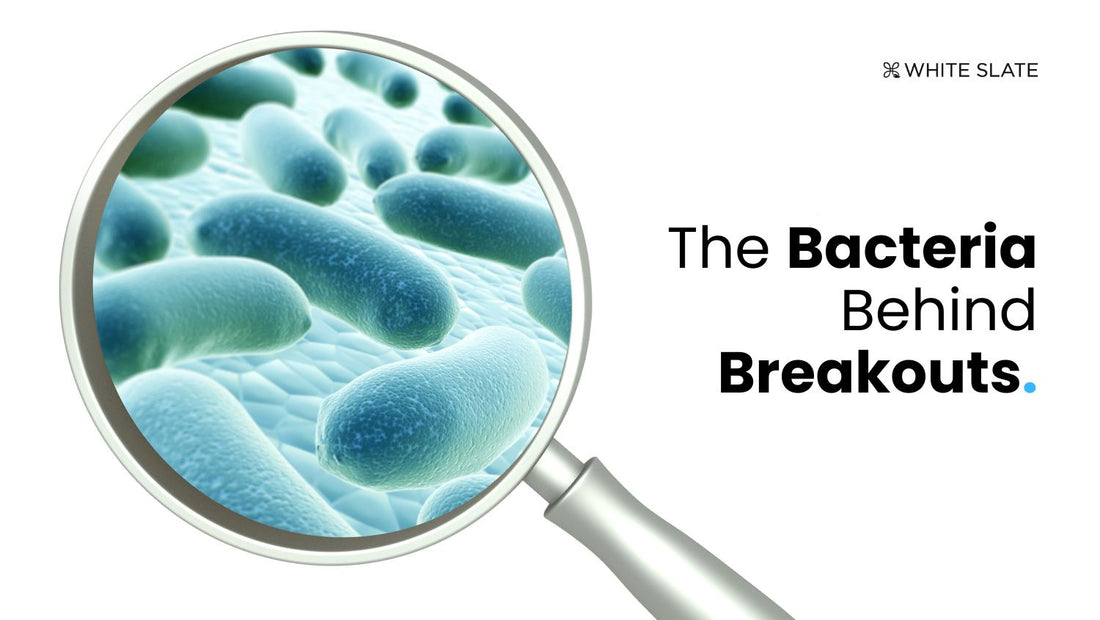The Bacteria Behind Breakouts: Causes & Skincare Solutions.
Introduction
Acne is a skin condition that nearly everyone experiences at some point in their lifetime. From blackheads and whiteheads to painful pimples, acne can be frustrating and difficult to manage. But why do they happen? The culprit is the bacteria that cause breakouts—a small germ called Cutibacterium acnes (previously Propionibacterium acnes). It typically resides on your skin but becomes problematic when it overgrows.
Learning how this bacteria leads to acne and how to treat it with healthy skin care can actually be beneficial. Let's see how to prevent breakouts with calming, moisturizing, and evidence-based skincare.
What Is the Bacteria Behind Breakouts?
There are numerous types of bacteria in the skin, and one of them, Cutibacterium acnes, causes pimples. The bacteria live on dead skin cells and excess oil (sebum). If your pores are clogged, the bacteria multiply very rapidly and cause inflammation. This results in red, inflamed bumps which we refer to as acne.
Hormonal fluctuations, diet, stress, and bad skin care can make your skin produce more sebum and have more pimples. Luckily, however, if you are on a regular and intelligent skincare routine, you can control bacteria population and alleviate acne.
Step-by-Step Skincare Routine to Combat Acne
1. Use a Gentle Cleanser Daily
Start and finish the day by washing your face with a gentle cleanser . Avoid strong soaps or foaming cleansers that strip your skin of its natural oils. Opt for a cleanser with soothing ingredients such as green tea extract, chamomile, and allantoin. These soothe inflammation, cleanse your pores, and guard your skin.
Use a mild cleanser that strips away excess oil, dirt, and bacteria without drying or irritating your skin— a step crucial to keeping the bacteria that cause breakouts under control.
2. Apply a Hyaluronic Acid Toner
Once you've cleansed, use a toner that contains hyaluronic acid to normalize your skin's pH and provide moisture. Moisturized skin heals quicker and will be less likely to over-produce oil.
Toners with soothing ingredients such as peppermint, Indian lotus, and mulberry are also available. These soothe redness and calm easily irritated acne skin. Hyaluronic acid also hydrates without pore-clogging, making it very suitable for oily and combination skin.
3. Apply a Light Silk Cream
Moisturizing is even required for oily skin. A gentle silk cream containing vitamin B5, ceramides, and plant oils fortifies the skin barrier. A healthy skin barrier repels harmful bacteria and avoids new acne.
These creams utilize hydrolyzed silk proteins to repair your skin and smoothen and even it. Apply this daily after toner, particularly in the evening, to aid your skin in healing.
4. Shield Your Skin with Niacinamide Sunscreen
Most individuals do not wear sunscreen, but it is totally necessary—particularly if you wear products that take away dead skin cells or dry out pimples. Choose a sunscreen that contains niacinamide. Niacinamide is a powerful ingredient that balances oil, reduces redness, and smooths skin.
Seek sunscreens that contain natural ingredients such as aloe vera and peppermint to calm the skin but shield it from damaging UVA/UVB rays.
Ingredients to Look For in Anti-Acne Products
When treating the bacteria that causes the breakouts, seek out products that contain:
- Niacinamide: Anti-inflammatory and reduces oil.
- Hyaluronic Acid: Extreme moisture that won't clog pores.
- Green Tea Extract: Anti-bacterial and calming.
- Chamomile and Allantoin: Soothe and calm irritation to heal.
- Ceramides: Repair and protect the skin barrier.
- Mulberry and Indian Lotus: Natural antioxidants that calm stressed skin.
Avoid products with alcohol, sulfates, fragrance, or comedogenic ingredients.
FAQs
Q1. Can bacteria actually make acne happen?
Yes, the bacteria causing acne develop in clogged pores and inflamed skin. Reducing oil production and employing antibacterial components can assist.
Q2. Is it okay to apply moisturizer on oily skin?
Absolutely. A light silk-based moisturizer will hydrate without producing excess oil and restore the skin barrier.
Q3. What way does niacinamide treat skin breakouts?
Niacinamide regulates oil production, reduces inflammation, and improves the texture and tone of the skin.
Q4. Will a toner containing hyaluronic acid make my skin oily?
No. Hyaluronic acid is a water-like substance and hydrates deeply without leaving the skin oily.
Q5. Can sunscreen make acne worse?
Not if you select the correct formula. Apply a niacinamide-containing sunscreen with a non-comedogenic base so that pores aren't clogged.
Final Thoughts
Taking care of the bacteria that cause breakouts begins with a kind, good skin care practice. Stay away from harsh chemicals and use soothing, plant-based products that balance oil and maintain healthy skin. Being consistent and cautious can reduce flare-ups and produce clearer skin.
Disclaimer
This article is for informational purposes only and is not a replacement for medical advice. If you suffer from persistent or severe acne, consult a qualified dermatologist. Always test skincare products on a small area first before applying to your whole face.


1 comment
dc2n87